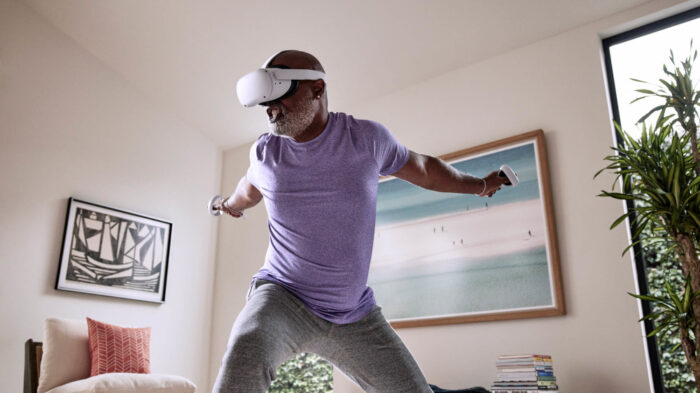เคยเขียนเรื่องวิสัยทัศน์ด้าน Metaverse ของหลายๆ บริษัทไปแล้ว (Snap, Niantic, Unity, Epic) แต่ยังไม่เคยเขียนถึงวิสัยทัศน์ของบริษัท Meta จากมุมมองของบริษัทเองสักที มีแต่เคยเขียนวิจารณ์จากมุมมองของตัวผมเอง (Into the Metaverse)
ช่วงปลายปี 2022 มีบทความ Why we still believe in the future ของ Andrew Bosworth ออกมาพอดี ความสำคัญคือเขาเป็นทั้ง CTO ของ Meta และเป็นหัวหน้า Reality Labs ซึ่งเป็นฝ่าย Metaverse ทั้งหมดของบริษัท Meta เรียกง่ายๆ ว่าเป็นเบอร์สองของบริษัท เป็นรองแค่ Mark Zuckerberg เท่านั้น
บทความนี้เขียนมาเพื่อย้ำว่าบริษัท Meta ยังเชื่อใน Metaverse อยู่นะ เพราะตั้งแต่ “เล่นใหญ่” เปลี่ยนชื่อบริษัท Facebook เป็น Meta ในช่วงปลายปี 2021 ก็เจอแต่ปัญหามาตลอด (1 ปีแรกของ Metaverse ที่ยังไปไม่ถึงไหน) แถมตัวธุรกิจหลักของ Meta ที่เรียกว่า Family of Apps (Facebook, Instagram, Messenger, WhatsApp) ก็อยู่ในช่วงขาลง ผู้ใช้ลด รายได้ลด หุ้นตก จนโดนนักลงทุนรุมถล่มให้เลิกฟุ้งเรื่อง Metaverse และกลับมาสนใจเรื่องผลกำไรของธุรกิจปัจจุบันก่อน
These are the moments that truly test people’s belief in the future. During boom times, it’s easy to make big, ambitious investments in what’s coming next. But when economic conditions turn, it’s just as easy to turn the other way: cut back on your ambitions, stick to what’s safest and most profitable today, and squeeze as much as you can from it.
Bosworth วิจารณ์ว่าแนวทางเหล่านี้เป็น “การคิดระยะสั้น” (short-term thinking) ที่จะทำให้สูญเสียความสามารถทางการแข่งขันในระยะยาว
We’ve all seen the disastrous consequences of this kind of short-term thinking: hollowed out companies that gave up on innovating long ago, content to just turn the crank on an existing business until it stops working.
I grew up here and in my experience Silicon Valley tends to reject this kind of short-termism, which is one of many reasons why America has led the world in building new technologies.
เขายืนยันว่า Meta ยังเชื่อมั่นในวิสัยทัศน์ Metaverse เหมือนกับตอนที่ประกาศเปลี่ยนชื่อบริษัท
Meta remains as committed to our vision for the future as we were on the day we announced it.
สัดส่วนการลงทุนของ Meta คือ 20% ให้กับธุรกิจใหม่ (Metaverse/Reality Labs) ส่วนอีก 80% คือธุรกิจเดิม (Family of Apps)
about 80% of Meta’s overall investments support the core business, with the other 20% going toward Reality Labs. It’s a level of investment we believe makes sense for a company committed to staying at the leading edge of one of the most competitive and innovative industries on earth.
ในจำนวน 20% ที่ว่านี้ ยังถูกแบ่งครึ่งเป็น 2 ฝั่งคือ VR (Oculus เดิม) ที่เป็นแว่นครอบหัว ปิดตัวเองจากโลกภายนอก และ AR แว่นที่มองทะลุได้ แสดงผลความจริงแบบผสมผสาน (mixed reality) ที่ทำยากกว่ามาก จึงต้องเริ่มลงทุนวิจัยเทคโนโลยีพื้นฐานไว้ตั้งแต่ตอนนี้
While our VR devices and software get most of the public attention, we are directing about half of our Reality Labs operating expenses towards our AR initiatives
Our vision for true AR glasses will require years of progress making our devices slimmer, lighter, faster, and more powerful, all while consuming way less battery power and generating much less heat.
Building true AR glasses will require a massive set of breakthroughs and inventions across all sorts of areas, from lenses and miniature displays to lightweight materials and AI-powered interfaces.
นิยาม Mixed Reality ของ Meta เป็นชุดของเทคโนโลยีหลายอย่างมารวมกัน เช่น การตรวจจับใบหน้า-นัยน์ตาของผู้สวมแว่น, การหาตำแหน่งของวัตถุเสมือนแล้ววางทับบนโลกจริง (Spatial Anchors), การสแกนภาพจากโลกจริง เข้าใจว่าอะไรเป็นอะไร (Scene Understanding) ก่อนนำมาสร้างมันใหม่ในโลกเสมือน
Mixed reality is a key part of the journey toward full augmented reality devices, and eye and face tracking is an essential piece of the technology stack needed for AR and VR devices to reach their full potential.
Mixed reality is about much more than just displaying a live video feed of your surroundings inside the headset. For it to work properly, the headset needs to understand your room as a 3D space, recognizing the surfaces and objects around you and how they can interact with digital objects.
Meta มองว่าการเกิดขึ้นของ Mixed Reality จะทำให้แว่น VR กลายมาเป็นสิ่งทดแทนคอมพิวเตอร์และจอมอนิเตอร์ (ตรงนี้ผมอ่านแล้วยังกังขาว่าเป็นจริงเช่นนั้นหรือ)
Over time it’s clear that mixed reality will help VR devices become increasingly compelling alternatives to laptops and desktop computers, placing virtual screens and interfaces on your desk or in your hands. It won’t be long before a VR headset is capable of emulating a powerful home computer setup, from a device that fits in a backpack and can be used anywhere.
โลกเสมือนของ Meta จะเอาไว้ใช้ทำอะไร จากทิศทางของบริษัทในช่วงหลังๆ เราจะเห็นว่ามี use cases ที่เห็นได้ชัดๆ อยู่ 3 เรื่อง ดังเห็นได้จากโปรเจคต่างๆ ของบริษัท ทั้งทำเองและซื้อมา คือ
- Gaming = ซื้อ Beat Saber
- Social = Horizon Worlds
- Fitness = ซื้อ Within
หมายเหตุ: ในเว็บไซต์ของ Meta ลิสต์ไว้ 5 อย่าง เพิ่มอีก 2 อย่างคือ Entertainment พวกดูหนังดูคอนเสิร์ต และ Work ประชุมออนไลน์ (ซึ่งผมนับรวมเป็นส่วนหนึ่งของ Social)
We saw game developers continue their incredible streak of innovation that is shaping the future of their industry. Social experiences became the most popular apps on the Quest Store, validating a belief we held from the moment we began investing in VR: that this is a fundamentally social technology. And fitness apps continued their amazing rise, bringing whole new communities into VR for the first time and showing that this is a platform whose full potential is still in the earliest stages of being understood.
ตรงนี้ผมคิดว่าตัวอย่างการใช้งาน 3 หมวดอันนี้ชัดเจนว่ากลุ่มเป้าหมายคือใคร แตกต่างกันอย่างไร แต่อะไรคือเหตุผลที่เราควรต้องสวมแว่น VR เพื่อมาเข้าถึงประสบการณ์เหล่านี้ ที่ดีกว่า คุ้มค่ากว่า การไม่ใส่แว่น มากจนถึงระดับต้องแลกกับความหนักหัวหรือความยุ่งยากของการใส่แว่นแค่ไหน อันนี้ Meta ยังนำเสนอได้ไม่ชัดเจนเท่าไร

